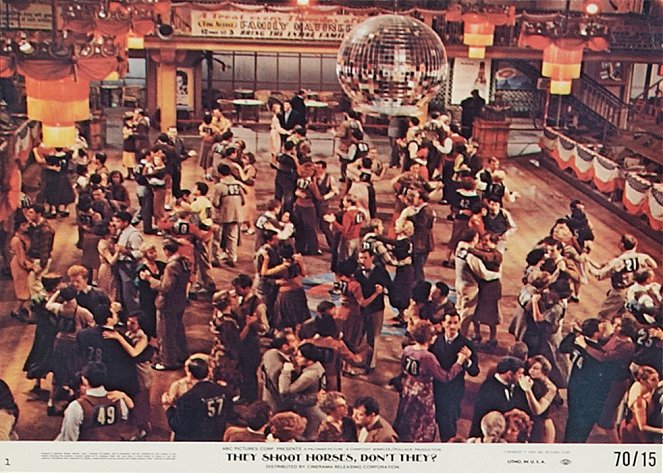Director:
Sydney PollackCámara:
Philip H. LathropMúsica:
Johnny GreenReparto:
Jane Fonda, Michael Sarrazin, Susannah York, Gig Young, Red Buttons, Bonnie Bedelia, Bruce Dern, Felice Orlandi, Art Metrano, Tim Herbert, Ian Abercrombie (más)Streaming (1)
Sinopsis(1)
Estados Unidos, en plena época de la Gran Depresión. En medio de un ambiente de terrible miseria, gentes desesperadas, de toda edad y condición, se apuntan a una maratón de baile con la esperanza de ganar el premio final de 1500 dólares de plata y encontrar, al menos, un sitio donde dormir y comer. Mientras los concursantes fuerzan los límites de su resistencia física y psíquica, una multitud morbosa se divierte contemplando su sufrimiento durante días. (Filmin)
(más)Reseñas (5)
It is 1931 and the economic crisis is reaching its peak. Everyone is trying to grab a piece of bread in this uncertain time and move up into the spotlight or forget about the difficulties of the era through some type of show. One option for escape is a dance marathon, which, however, has nothing to do with dance as a physical activity for relaxation and entertainment. It is an exhausting struggle to see which couple can keep moving in the arena for as long as possible. The prospect of profit leads the contestants to utter exhaustion, and the manipulative host only encourages their self-destruction. A famous director is said to be in attendance, claiming to be looking for new stars for his film. Then he offers a staged marriage to the performers to increase the viewership of his declining spectacle. At regular intervals, the "dance creations" are interrupted by a race between the couples, and these shots of exhausted unhappiness are among the strongest moments of the film. The last three couples are being eliminated, so everyone tries to push themselves to the limit. The film is actually a metaphor for the ruthless competition in American show business and society as a whole. An incredibly depressing affair and one of the most hopeless films I have had the opportunity to see. Overall impression: 95%.
()
Interesting. In his own way, Sydney Pollack translates this dystopian premise in an almost unsettlingly detached fashion. The outside world basically doesn’t exist, everything is framed only within the inhuman competition, which itself incarnates the criticised nature of society – tired people plodding around in stereotypical duties, suffering hunger in crisis-stricken times, while serving a decadent and sensation-seeking bourgeois elite. Harder to grasp than most Hollywood productions of the time, the film points to a one-sided depression without providing any clues that could mentally free the numbed viewer. It’s a pity then that, despite all those good things, the film is still too polished and unsurprising; it’s missing a stronger author’s signature and clearer conflicts that would better portray that world with personalities that are falling apart internally. But the message is very strong and Jane Fonda, who has never been so convincing, also has the lion’s share. A strong film for discomfort. 85%
()
Horace McCoy predicted that a public space would arise where every dumbass could get instantly rich at the expense of a complete loss of pride, and Sydney Pollack in turn hinted at roughly what that would look like. About people who would rather accept the rules of a game they have no chance of winning than try to change them. A sadistic horror film where everyone is to blame.
()
They Shoot Horses, Don't They? is definitely not one of those films that will excite every viewer, but if open yourself to the film a bit, you'll have a very unusual and interesting experience that won't be repeated. It’s an original and strange film with very strong informative value - if you open yourself to it.
()
Sydney Pollack, supported by the brilliant book source material, embarked on a scathing critique of the flaws of the society at the time in the backdrop of a crazy dance marathon in such a devastating way that it necessarily freezes the smile of any somewhat sensible person even today. This is a truly timeless film, in which Jane Fonda shines to the fullest. The bitter symbolism of the few artfully put-together words They Shoot Horses, Don't They? only fully hits the viewer in the last minutes of the film. (95%)
()

